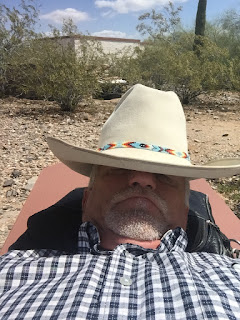Under the Broom Tree
Exhausted, he sat in the shade of a broom tree. It’s probably not like our own Desert Broom (I call it a weed – it’s an extremely objectionable thing), but I associate them both just the same. The broom tree was merely a desert shrub, sometimes large enough to provide a bit of shade. It’s a pathetic place to find rest.
But rest was what he needed, and the broom tree would have to do. For a full day, he’d been running away from Queen Jezebel. It was a desert a lot like ours. He was hot. He was tired. He was hungry. Out of gas, out of ideas, and out of sorts. “I have had enough,” he said, and he went to sleep in what little shade he could find.
Ever felt like Elijah? You have, you do, or you will. Sometimes, we’ve just had enough. We thought our plan was good, but nothing turned out right. We thought we’d have a reasonable conversation, but all we did was fight. We thought we’d turned a corner, but there was just another red light. “I have had enough,” we say, and we find the nearest broom tree, or bar stool, or bed sheets.
Look at what God does next. “An angel touched him and said to him, ‘Arise and eat.’” Not a lecture. Not a miracle. Just a meal. God cooked the exhausted man a meal – two, in fact! Sometimes, our despondency is due to physical exhaustion. We need a meal. We need rest. God, who made our bodies, knows this. God gave Elijah a meal. It sustained him for the long journey ahead.
Where was Elijah going? “To Horeb, the mount of God.” We know it better by another name: Mount Sinai, the place where Moses met God. Why is Elijah going there? Probably because he wants to meet God, too. After all, we’re told, “he came to a cave and lodged in it.” But the original Hebrew word is not cave: it is “cleft.” We can’t help but wonder: “Is this the same cleft where Moses met God (Ex 33:22)?
Maybe this is what Elijah is thinking: “I’m going back to where it all started. After Israel worshiped the golden calf, Moses saw God on the mountain. Israel is just as disobedient now as they were then. I will go where Moses went. I want to see God. It’s time for us to have it out.”
In any case, we know that God met Elijah on the mountain. While he hid in the cave/cleft, the Lord came by in a wind of hurricane force, destroying the rocks which protected the prophet. But when the wind was gone, so was the Lord. After that, there was a fire, and then an earthquake, and still, silence.
Finally, in the stillness, there was a voice as low as a whisper: “What are you doing here, Elijah?” It was the second time the Lord had asked the question, and both times Elijah voices his complaint. Essentially, he said, “Why has nothing turned out the way I expected it to? I did my part; why haven’t you done yours?”
Elijah is brutally honest with God. His honesty startles us, but we all know what he is feeling. Sometimes life doesn’t turn out like we expect, and it seems like God is sleeping on the job. Yes, Elijah was physically exhausted. But he was spiritually exhausted, too. His triumph on Mt. Carmel was supposed to bring Israel back to God, but it hadn’t. Instead of a revolt against the corrupt kingdom, it was business as usual when Elijah went to Jezreel. Rather than repentance by the royal family, there was the threat of royal vengeance.
Elijah had had enough. His expectations were dashed, and his perspective was skewed. He was angry, disappointed, and ready to cash in his chips. As far as he was concerned, the whole project had been a failure, and no one appreciated the sacrifices he had made.
In gentle whispers of wisdom, God reminded him that his responsibility was for obedience, not outcomes. There was more work for him to do: some kings and an apprentice prophet to anoint. And God assured him that, despite how it appeared, Elijah was not alone in the battle. He could not see the big picture, but God could. Elijah would just have to trust him.
Countless of us throughout history have found ourselves at similar crossroads. We’re exhausted physically, emotionally and spiritually. God knows what we need. Sometimes it’s a nap. Sometimes it’s a meal. Sometimes it’s a kick in the pants. Sometimes it’s the reassurance that our task is to obey, and to leave the results in God’s hands. Sometimes he comes to us like fire from heaven, but mostly, it’s the gentle whisper of his still small voice: “Trust me, and do what I tell you to do.”
